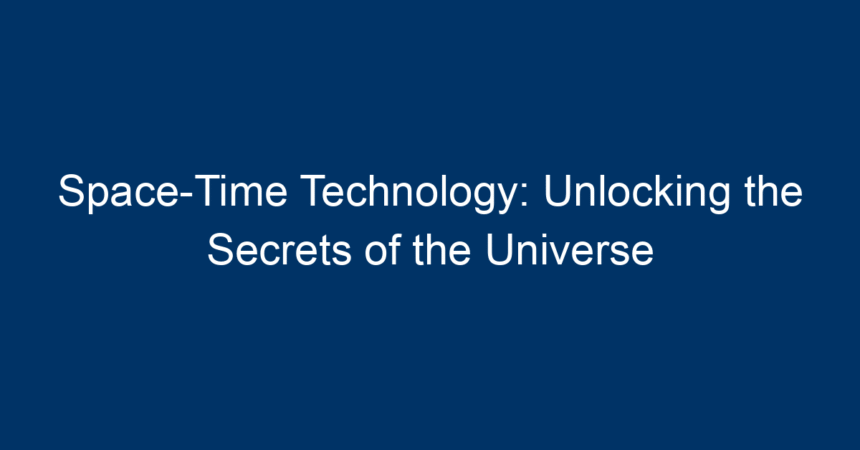Introduction
In the quest to understand the cosmos, scientists have long grappled with the fabric of the universe—time and space. Recently, the term "space-time technology" has emerged as a buzzword among physicists and enthusiasts alike, representing a revolutionary approach to grappling with the complexities of our universe. This article delves into what space-time technology is, its implications, and how it could reshape our understanding of reality. Buckle up as we embark on a journey through the intricate tapestry of space-time!
Understanding Space-Time
The Concept of Space-Time
Space-time is a term that describes the four-dimensional continuum that merges the traditional three dimensions of space with the dimension of time. Popularized by Albert Einstein’s theory of relativity, this concept proposes that events are not just located in space but also in time, forming a four-dimensional construct that shapes our existence.
The Significance in Modern Physics
Understanding space-time is crucial for multiple branches of physics, including cosmology, quantum mechanics, and gravitational physics. Events that occur in the universe cannot be viewed as isolated phenomena; they must be understood in the context of their position in space-time. This integrated view helps scientists decipher the mysteries of black holes, the behavior of galaxies, and the very nature of time itself.
The Implications of Space-Time Technology
Theoretical Foundations
At its core, space-time technology leverages the foundational principles of general relativity. Scientists propose various technologies that may alter our interaction with space and time. This could include anything from advanced propulsion systems for space travel to theoretical constructs like wormholes and time machines.
Practical Applications
-
Advanced Propulsion Systems: Imagine a future where spaceships can travel vast cosmic distances at unprecedented speeds. Utilizing concepts such as warp drives, which compress and expand space-time, could make interstellar travel a reality.
-
Time Manipulation: Theoretical models propose that if we could navigate through space-time effectively, time travel might not be an impossibility. While this remains speculative, certain experiments in quantum physics have hinted at aspects of entangled particles that defy conventional understanding of temporal flow.
- Enhanced Communication Technologies: Space-time technology could revolutionize communication between spacefaring entities. The concept of utilizing gravitational waves for faster-than-light communication is rapidly evolving from science fiction to serious scientific discourse.
Ethical Considerations
As with any technological advancement, space-time technology raises ethical questions. If time travel becomes feasible, how will it affect our understanding of cause and effect? What moral responsibilities do we have if we can alter events in the past? These questions require collective societal contemplation alongside scientific progress.
Current Research and Developments
Theoretical Research
Leading physicists are continuing to explore the nuances of space-time technology. Notable projects, such as the EmDrive—which theoretically claims to generate thrust without fuel by manipulating space-time—are at the forefront of modern research. While many of these ideas are still in their infancy, their development demonstrates the potential that space-time technology holds.
Experimental Approaches
Institutions around the world are conducting experiments aimed at unraveling the mysteries of space-time. For instance, the Laser Interferometer Gravitational-Wave Observatory (LIGO) has successfully detected gravitational waves, providing empirical evidence for ripples in space-time caused by cosmic events like merging black holes. Such discoveries may pave the way for new technologies that harness the principles of space-time.
The Role of Quantum Mechanics
Quantum Entanglement
One of the most intriguing aspects of space-time technology intersects with quantum mechanics, particularly quantum entanglement. This phenomenon, where particles become interconnected regardless of distance, suggests that our current understanding of space and time may be incomplete. If we can better manipulate these entangled states, could we unlock new dimensions of space-time technology?
Quantum Computing
Advancements in quantum computing could also enhance our understanding of space-time. By utilizing the principles of superposition and entanglement, researchers may develop algorithms capable of solving complex space-time equations far faster than classical computers can.
Challenges to Overcome
Scientific Limitations
Despite the tantalizing potential of space-time technology, numerous challenges remain. Theoretical physics is often mired in complexities that lack experimental validation. Furthermore, problems such as energy requirements for hypothetical devices like warp drives present significant obstacles.
Societal Acceptance
Also, the broader societal implications of space-time technology will require careful dialogue. Achieving public understanding and acceptance of such advanced concepts will be key in shaping future policies and ethical considerations.
Future Prospects
The Space-Time Era
As we stand at the brink of what could be considered a "Space-Time Era," the possibilities are as vast as the universe itself. The enhancement of our scientific toolkit through applications of space-time technology may lead to unprecedented breakthroughs in our understanding of reality. Envision a world where interstellar travel becomes commonplace, or where understanding the very nature of time allows us to predict cosmic events with astounding accuracy.
Collective Exploration
As professionals from diverse fields such as physics, engineering, and philosophy begin to interconnect their ideas, we may finally unlock the full potential of space-time technology. Public engagement and interdisciplinary collaboration will be vital as we steer toward uncharted territories in both knowledge and technology.
Conclusion
Space-time technology has the potential to revolutionize our entire understanding of the universe. From advanced propulsion systems to time manipulation, the implications are vast and varied. While we may be at the forefront of exploring this fascinating area, we must approach it thoughtfully, considering both the scientific and ethical dimensions.
The future of space-time awaits. What role will you play in unlocking its secrets? Engage with local science communities, support innovative research, or even just stay curious. The journey of exploration has just begun—be a part of it!
By embracing the profound wonders of space-time technology, we can collectively forge a path toward a deeper understanding of our universe. Let curiosity guide you into the cosmos!




